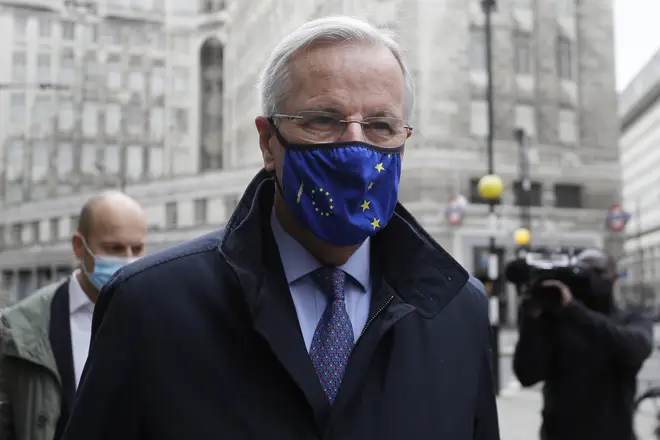
Oli Dugmore 4am - 7am
26 October 2020, 06:42

Talks between Britain and the EU on a post-Brexit trade deal are continuing in London after Michel Barnier delayed his return to Brussels.
The EU's chief negotiator is expected to remain in the UK until Wednesday to carry on intensive discussions with his British counterpart Lord Frost.
Mr Barnier originally arrived in London on Thursday to resume the stalled negotiations and had been expected to return on Sunday ahead of the talks switching this week to the Belgian capital.
Read more: Business groups say cost of everyday items 'could soar' under no-deal Brexit
Read more: EU criminals could be barred from entering the UK post-Brexit
The decision to stay in London was thought, at least in part, to be related to soaring coronavirus infection rates in Brussels.
Nevertheless Northern Ireland Secretary Brandon Lewis said the move was a "very good sign" that the talks were progressing.

Brexit: What is an Australia-style trade deal?
"I think there is a good chance that we can get a deal but I think it is for the EU to understand that it is for them to move as well," he said.
Time is running short if there is to be an agreement before the Brexit transition period comes to a close at the end of the year.
The UK and the EU had previously said they would need to get a deal by mid-October if it was to be implemented in time.
Prime Minister Boris Johnson has said that if there is no agreement, Britain will start trading with the bloc on "Australian terms" - shorthand for World Trade Organisation rules.
However the prospect of the imposition of tariffs and quotas has alarmed many businesses already reeling from the fallout from the coronavirus pandemic.
The main obstacles to a deal remain fishing rights, so-called "level playing field" rules to ensure fair competition and governance arrangements for any agreement.

Business Minister sets out the difference between an Australia-deal and a No-Deal Brexit.
On Sunday, a major UK business group warned import costs for everyday items could rise by around a third in the event of a no-deal Brexit, making the household shopping basket "much more expensive."
The cost of moving goods could also rise due to tariffs, and restrictions to the number of lorry access permits available to enter the EU could put businesses across the country at risk, Logistics UK said.
David Wells, chief executive of the organisation previously known as the Freight Transport Association, urged the Government to keep working towards a deal, saying a no-deal scenario could drive inflation up as a result of the rise in prices for imported goods.
In a letter to the Sunday Times, he said: "Everyday household items we import will become more expensive under World Trade Organisation tariffs, some by 30% or more.
"This will make the household shopping basket much more expensive, particularly in the early part of 2021 when we rely on imports for much of our fresh food."
Senior Cabinet minister Michael Gove has acknowledged that leaving the transition period without a trade deal would cause "some turbulence".
In his letter, Mr Wells added: "The actual cost of moving goods will also increase, if new vehicles, parts and tyres are also subject to tariffs.
"This is more than 'turbulence', as suggested by Mr Gove last week, and logistics businesses, operating on 2% margins, cannot afford to take on these costs."